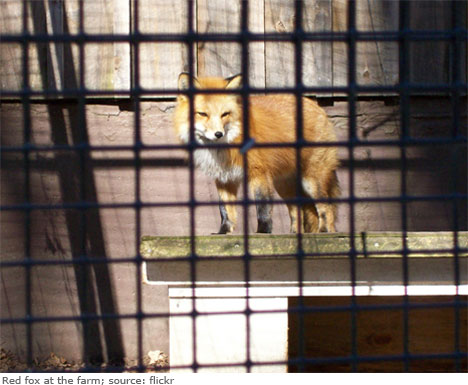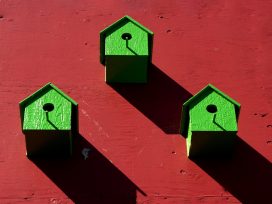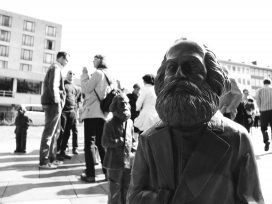Almantas Samalavicius: While reading your novel I was amazed at how successfully you reworked Orwell’s Animal Farm. How did you get the idea of attempting to tell the story of the Western market economy by borrowing the framework of Orwell’s novel?
Nicholas Bradbury: It may sound odd, but I think the story chose me rather than vice versa. I think stories choose writers. I had wanted to write a book since I was a teenager, but nothing compelling had “come to mind” as we say. Then one day this idea did, and it crystallized very rapidly in my head, and it seemed absolutely right. In hindsight, it was one of those ideas that seemed so simple, I could not imagine why it had not been done before.
AS: As we know, Orwell’s first attempts to find publisher for Animal Farm were largely unsuccessful, since the publishers he approached claimed that animal stories don’t sell. How did you get your “animal story” published?
NB: Yes, getting a first book published is far from easy. I wrote it pretty quickly in 2008. But it took much, much longer to get published. I initially went via a friend who is a published writer of historical fiction, hoping that his introduction to agents would help. But they just sat on the manuscript without reading it. Then I researched myself and sent off the manuscript to a small number of likely looking agents, and Jüri Gabriel was kind enough to read it and suggest that with a small number of changes it might work. So I revised it, sent it back, and Jüri sent it out. We had a very quick expression of interest from a financial publisher, but he wanted to change the story substantially and I felt that I could not agree with some of his ideas. Luckily, after another long hiatus, Dedalus also liked it, so here we are!
AS: Your novel is a sharp and witty satire of the Western “free-market” economy and to a certain degree its lifestyle based on endless consumption, limitless exploitation of nature, greedy accumulation of wealth and all the other vices resulting from such an attitude. What other literary and philosophical sources inspired your criticism? What authors in the field of economics do you find wise, balanced and free from the prejudices of present neo-liberal doctrines? Were any of these important to you while writing a novel?
NB: Philosophically, everyone in the West is mainly influenced by Plato and the Bible, whether they realize it or not, or like it or not. Subconsciously, Hans Magnus Enzensberger’s wonderful poem, “Hirudo sanguisuga oder: Analekten zur Staatsbürgerkunde” must have been the seed of the idea. Swift probably was an influence stylistically. I don’t think satire gets better than Swift. It may be that Kurt Vonnegut and Martin Amis, who are also very funny in a philosophical way, had an influence. Other than that, it is hard to say. Among economists, I suppose Marx, Keynes and Galbraith have been more influential on me than Smith and Hayek. But I’m not an economist, so I’m not sure how directly influential they will have been. I think I see things more simply, and as a linguist focus more on the role of ideology, how this shapes the political process, through language. That and age-old questions of greed and the dangers of debt. Perhaps more fundamentally, the book questions one form of materialism, as Orwell questioned a different form. Among philosophers, perhaps Augustine and Kant are relevant to my thinking, but Nietzsche may have been a more influential. He confronts modernity with such stark honesty. Among contemporary thinkers about the financial crisis, I think Nassim Taleb, the author of The Black Swan and Antifragile, is very interesting, in fact much more so than is generally appreciated. Russell Napier at CLSA was also prophetic. I should probably read more of John Gray.
AS: How did you yourself get disillusioned with the promises of the “free-market” economy? And why do you think this concept doesn’t work?
NB: Gosh. When are the easy questions coming? Well I think in one sense it is very simple. The promise of the free market is that it is highly productive, which it is, and that it is the fairest way to regulate social relations, because market prices are objective reflections of the utility that society attaches to the things they represent. My libertarian friends would argue this, I think.
The problem, of course, is that in various ways, economic actors gain advantages so that the distribution of economic power becomes very unequal. And if, as it were, dollars replace votes, then those with the most dollars use that power to shape society in ways that benefit them. And if you look at the statistics, there is no doubt that the average person in the West has been getting poorer in real terms for decades, with the famous one per cent reaping most of the benefits.

Libertarians might argue that such inequality is either morally justified as such, or that it occurs only when government falls into the hands of a cabal of economic actors through fraud and corruption. My view is that rising inequality is inevitable in a so-called free market – in fact I am told that chaos theory supports this contention – and that corrupt government is not the cause, but a symptom that also makes it worse. Inequality can easily result from pure chance, and in any case, high levels of inequality are morally wrong in themselves, because as social animals we have a duty to share with others, and gross inequality shows that this is not happening.
Debt – which is at the heart of the book – greatly magnifies these distortions, which is why it is so pernicious, and why we now have medieval levels of inequality in many countries. And since debt is a claim on the future, it also creates huge intergenerational disparities, the ultimate revenge of the old on the young, as evidenced by soaring youth unemployment.
Perhaps more fundamentally, the free market’s very productivity may be a long-term negative, as the relentless need for growth destroys resources and creates pollution to such an extent that continued human existence becomes unsustainable. But this also brings in questions about materialism as an approach to life.
AS: From a brief biographical note one can guess you have a lot of experience in government, business and banking. To what degree did your personal experience in these fields influence your subject matter and attitude towards the form and content of Market Farm? The depiction of “piggy-banks” run by rabbits – how much is it affected by your own time in banking?
NB: I don’t think you can draw direct inferences of this sort. I’m not suggesting that all bankers are bright-eyed and bushy tailed, or that all politicians have snouts. The human comedy manifests itself in any field and good satire merely brings it to life. Think of Swift’s marvellous look at religion in The Tale of a Tub. I have spent most of my life in financial PR, as an observer of government, banking and commerce, so it has allowed me to think about the rituals of our society, which centre on money rather than theology. That is all.
AS: Orwell’s novel ends in the blurring of differences between humans and animals. Your novel ends with an alarming farewell to freedom. Do you interpret the free-market economy as an instrument capable of destroying the foundations of freedom?
NB: Any ideology has the potential to destroy freedom, because it allows one group of people to dominate others intellectually and economically. So, paradoxically, appeals to “freedom” can become instruments for its actual suppression, just as in Animal Farm, appeals to equality were used to undermine equality. When those preaching the free market are in fact using their power simply to protect their interests – or, in the case of the real intellectual naifs, to protect the interests of the already powerful – then the only freedom we might talk about is the freedom of the fox in the chicken run.
AS: As a writer and individual with experience in banking and business, what myths of the “free-market” would you describe as most illusionary and deceptive? What is your own vision of what is now often called the “new economy”? Do you see any chances of reshaping present capitalism so as to have some long-term prospects for development without destroying human society and nature?
What I disagree with most strongly is the idea that the market is the fundamental, natural state of human organisation, so that if you just get rid of government, which distorts market functions, all will be sweetness and harmony. This is completely misguided, in my view. You cannot divorce politics from economics, which is why the original term “political economy” is more accurate. To say otherwise is to remove any possibility of debate about how society should work, which is of course the idea. Rather than asking “What should we be doing?” all political discourse becomes reduced to variations on the theme of “How do we do more of the same?” In other words, there are no moral problems, only technical ones. Adam Smith would turn in his grave.
But it would be a mistake to think I am against markets as such. They are clearly powerful mechanisms for ordering society productively and in a way that allows individuals to fulfil themselves in ways that can be useful to others. I went to Poland and China in their “Communist” incarnations and they were clearly not societies that were flourishing. The great welfare states as they now exist in some of the countries of Western Europe are also built upon an economic lie, though they may have been a necessary correlative of individualism. And would you rather live in Market Farm or Animal Farm? Hayek’s criticism of life under bureaucracy can’t be simply dismissed.
If we have any hope it in is genuine democracy. In a real democracy, where people are continuously involved in collective decision-making amid conditions of relative openness and equality – in the classical or Aristotelian sense perhaps – I believe that markets would be confined to certain areas of life, while government would be confined to others. How this might be achieved is another question. Whether it can be instituted when conditions of great inequality prevail, or whether it can exist in large states where the political process is almost entirely mediated, and whether it entails social rather than individual ownership of productive assets, I don’t know. Switzerland perhaps comes closest in reality to a functioning democracy, as far as I have seen. But is it parasitic on societies that are less so?
As to whether humanity has a future, I see the problem as much deeper, that of materialism, especially what I might call vulgar materialism, which is to say the idea that life can and should be fulfilled through material pursuits. This is an idea that was rejected by almost all thinkers in the classical and medieval worlds, but which has gained increasing credence since the Enlightenment. More recently, some scientists even put materialism forward as a fact, rather than, as it is, a philosophical proposition that cannot be proven either way. I think Nietzsche understood the consequences of this, which is why he argued that society needs myths by which people can live. Materialism may be our myth, but perhaps a dangerous one. In any case, it is dominant in current thought and political discourse, because it upholds the economic status quo, reaching its apogee in this context in “social Darwinism”.
Quite probably materialism as a credo presents us with two possible outcomes, broadly speaking either Blade Runner – market success – or Mad Max – market failure. Certainly, if what scientists tell us about climate change is true, then it is probable that we are little more than giant lemmings rushing over an ecological cliff, and that the basis for not just human life, but for the life of all large mammals, may come to an end within two or three generations. The only materialist solution might be a rapid expansion of nuclear power, geo-engineering on a massive scale and the genetic modification of life, including of human beings. No doubt this is what the “establishment” will promote. I’m not sure most people would welcome this path, though, or indeed whether it would work. It has been suggested by at least one scientist that global economic collapse might be a good thing, as it may be the only way to reduce carbon emissions sufficiently quickly to save our life on earth. Of course, there would be widespread death, war, disease and famine. But the four horsemen are probably saddling up in any event.
Only one thing I am certain of; we will soon be facing the greatest change since at least the industrial revolution, and things will not continue as they have done in any sense. All of us need to talk about the way forward with as little bigotry as possible, and to laugh when we can.







